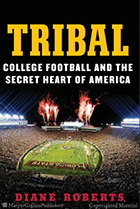 Since the fall 2015 release of her book, Tribal: College Football and the Secret Heart of America (HarperCollins), Diane Roberts has been on the usual publicity tour. National Public Radio hosts, book fair organizers, and various publications have interviewed her, as did Misha Rai for Southeast Review, the English department's literary journal. Mark Hinson of the Tallahassee Democrat talked with Roberts for an article that carried the headline "Are FSU football fans ready for the arrival of 'Tribal'?"
Since the fall 2015 release of her book, Tribal: College Football and the Secret Heart of America (HarperCollins), Diane Roberts has been on the usual publicity tour. National Public Radio hosts, book fair organizers, and various publications have interviewed her, as did Misha Rai for Southeast Review, the English department's literary journal. Mark Hinson of the Tallahassee Democrat talked with Roberts for an article that carried the headline "Are FSU football fans ready for the arrival of 'Tribal'?"
Roberts knows that conversations about college football need to go deeper than talk about wins and losses, in-state rivalries, and perfectly run pass routes. Not that she avoids these subjects in Tribal: "The game can be so beautiful, you see," she writes in the book's Pregame section, for example. "Watching Rashad Greene get under a long ball or Dalvin Cook juke left, right, left, left, running under and around to make fifteen yards, gives me immense pleasure." Still, aside from questions about her writing process and the origins of her subject matter, Roberts says she also occasionally had to defend the very existence of the sport, "as if all civilized people would disdain the game and wish, fervently, that it would go away."
 The inside of the book cover informs readers exactly what they are getting into regarding Roberts's take on the game's most controversial aspects: "One overeducated Florida State fan confronts the religiously perverted, racially suspect, and sexually fraught nature of the sport she hates to love: college football," reads the header over the jacket blurb. In fact, Roberts expresses throughout Tribal that her own enjoyment for football leaves her feeling "conflicted," yet she does not argue for one side over the other. Instead, she uses her research chops, her football smarts, her literary wit, and her personal history with the game and its surrounding spectacles to supply the "whys" and "hows" that create the controversy and debates.
The inside of the book cover informs readers exactly what they are getting into regarding Roberts's take on the game's most controversial aspects: "One overeducated Florida State fan confronts the religiously perverted, racially suspect, and sexually fraught nature of the sport she hates to love: college football," reads the header over the jacket blurb. In fact, Roberts expresses throughout Tribal that her own enjoyment for football leaves her feeling "conflicted," yet she does not argue for one side over the other. Instead, she uses her research chops, her football smarts, her literary wit, and her personal history with the game and its surrounding spectacles to supply the "whys" and "hows" that create the controversy and debates.
"I have too much of an Inner Barbarian to long for the game's total eradication," Roberts says. "I'm a product of my culture, too, a Southerner whose family identified with a particular university and its teams — i.e., FSU. I have no problem loving the game and finding it troubling at the same time."
She is able to pull off the balance in her writing, according to reviewers.
"In Diane Roberts's deft hands, football is never just a game — it's a mirror of American attitudes toward gender, class, and especially race. Roberts is a brilliant cultural critic and a dream of a writer, and Tribal is not only timely — it's necessary reading," writes Pulitzer Prize-winning author Gilbert King. "Tribal is a lover's quarrel with college football so raucous, so entertainingly appalled, and so wise that it goes down as easily as a shot of bourbon from a smuggled flask on a Saturday afternoon in the fall," adds author Will Blythe.
The chapters in Tribal are organized using a familiar system to football fans, from Pregame to Postgame with four quarters and a halftime in between. Roberts covers topics such as "Tribal Boundaries," "Clean, Old-Fashioned Hatred," "Muscular Christianity," and "The Gender Bowl," among others. She dedicates an entire chapter to Robert Champion, the Florida A&M University drum major who died after a hazing incident carried out by other band members on the band's bus.
Roberts broadens her coverage of football by using historical, biblical, and literary references, and with her experience as professor of literature and creative writing at both FSU and the University of Alabama, Roberts has an insider's perspective on how the college football environment dominates the South's landscape — athletically and, at times, academically. Roberts also devotes the entire final fourth of Tribal to discussing what she and other scholars see as connections with the South's history with slavery.
"I love the South and deplore it at the same time," Roberts says. "Paradox is part of being human — even more, it's part of being a writer."
She specifically mentions author and historian Taylor Branch's work, The Cartel: Inside the Rise and Imminent Fall of the NCAA. Branch, she writes, "suggests the vestiges of slavery are readily apparent on the field, then backs off and says maybe it's more like colonialism, talented athletes, the rich natural resource of this colony, produce football to be exploited by colleges and consumed by the spectators."
Roberts says in her interview with Southeast Review that, in a way, she has been writing Tribal her entire life.
"I was born into football culture and always loved the game and the rituals that surround it," she says, "though the older I get, the more my affection for it is tempered by a knowledge that like so much of what passes for a great American social institution, football's rotten at its core."
She published her initial ideas and opinions on the sport in 1998 in an 8,000-word article for The Oxford American. Since that time, she has kept clippings and notes in a file labeled "BALL." She pitched the book idea to her publisher, received the contract, and wrote Tribal in 16 months.
"The more I looked at football, the stranger it became: all that money, time, love and suffering tangled up over a bunch of 19- and 20-year-old boys running around a green field," Roberts told Southeast Review, explaining why she took on the book project. "As a football lifer — I inherited my father's season tickets when he died — it finally dawned on me… that football is about all the things I'm most interested in: race, gender, and history."
With Tribal, Roberts says she did not aim for objectivity but she did want to be fair.
"I have a position. But I hope that I haven't written a hectoring, naggy sort of book," she says. "I like to describe what I see. The way I describe it lets you in on how I feel about it. Maybe that's a battle cry, though in my case it's probably more of a battle snark. Satirizing something is a great way to call for change in it. Humor is subversive."
For Roberts's full Southeast Review Q&A, go to southeastreview.org/author-qa-diane-roberts/.
